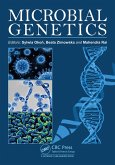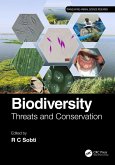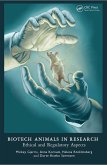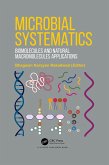Microbial Genetics (eBook, PDF)
Redaktion: Okon, Sylwia; Rai, Mahendra; Zimowska, Beata
173,95 €
173,95 €
inkl. MwSt.
Sofort per Download lieferbar

87 °P sammeln
173,95 €
Als Download kaufen

173,95 €
inkl. MwSt.
Sofort per Download lieferbar

87 °P sammeln
Jetzt verschenken
Alle Infos zum eBook verschenken
173,95 €
inkl. MwSt.
Sofort per Download lieferbar
Alle Infos zum eBook verschenken

87 °P sammeln
Microbial Genetics (eBook, PDF)
Redaktion: Okon, Sylwia; Rai, Mahendra; Zimowska, Beata
- Format: PDF
- Merkliste
- Auf die Merkliste
- Bewerten Bewerten
- Teilen
- Produkt teilen
- Produkterinnerung
- Produkterinnerung

Bitte loggen Sie sich zunächst in Ihr Kundenkonto ein oder registrieren Sie sich bei
bücher.de, um das eBook-Abo tolino select nutzen zu können.
Hier können Sie sich einloggen
Hier können Sie sich einloggen
Sie sind bereits eingeloggt. Klicken Sie auf 2. tolino select Abo, um fortzufahren.

Bitte loggen Sie sich zunächst in Ihr Kundenkonto ein oder registrieren Sie sich bei bücher.de, um das eBook-Abo tolino select nutzen zu können.
This comprehensive book explores both the fundamental and practical aspects of microbial genetics, shedding light on viroids, viruses, phytoplasma, bacteria, fungi, and protozoa.
- Geräte: PC
- mit Kopierschutz
- eBook Hilfe
Andere Kunden interessierten sich auch für
![Microbial Genetics (eBook, ePUB) Microbial Genetics (eBook, ePUB)]() Microbial Genetics (eBook, ePUB)173,95 €
Microbial Genetics (eBook, ePUB)173,95 €![Biodiversity (eBook, PDF) Biodiversity (eBook, PDF)]() Biodiversity (eBook, PDF)168,95 €
Biodiversity (eBook, PDF)168,95 €![Biotech Animals in Research (eBook, PDF) Biotech Animals in Research (eBook, PDF)]() Biotech Animals in Research (eBook, PDF)56,95 €
Biotech Animals in Research (eBook, PDF)56,95 €![Microbial Genomics and Drug Discovery (eBook, PDF) Microbial Genomics and Drug Discovery (eBook, PDF)]() Microbial Genomics and Drug Discovery (eBook, PDF)262,95 €
Microbial Genomics and Drug Discovery (eBook, PDF)262,95 €![From Chromosomes to Mobile Genetic Elements (eBook, PDF) From Chromosomes to Mobile Genetic Elements (eBook, PDF)]() Lee B. KassFrom Chromosomes to Mobile Genetic Elements (eBook, PDF)52,95 €
Lee B. KassFrom Chromosomes to Mobile Genetic Elements (eBook, PDF)52,95 €![Bacterial Genetics and Genomics (eBook, PDF) Bacterial Genetics and Genomics (eBook, PDF)]() Lori SnyderBacterial Genetics and Genomics (eBook, PDF)54,95 €
Lori SnyderBacterial Genetics and Genomics (eBook, PDF)54,95 €![Microbial Systematics (eBook, PDF) Microbial Systematics (eBook, PDF)]() Microbial Systematics (eBook, PDF)60,95 €
Microbial Systematics (eBook, PDF)60,95 €-
-
-
This comprehensive book explores both the fundamental and practical aspects of microbial genetics, shedding light on viroids, viruses, phytoplasma, bacteria, fungi, and protozoa.
Dieser Download kann aus rechtlichen Gründen nur mit Rechnungsadresse in A, B, BG, CY, CZ, D, DK, EW, E, FIN, F, GR, HR, H, IRL, I, LT, L, LR, M, NL, PL, P, R, S, SLO, SK ausgeliefert werden.
Produktdetails
- Produktdetails
- Verlag: Taylor & Francis eBooks
- Seitenzahl: 374
- Erscheinungstermin: 21. Juni 2024
- Englisch
- ISBN-13: 9781040042977
- Artikelnr.: 70096883
- Verlag: Taylor & Francis eBooks
- Seitenzahl: 374
- Erscheinungstermin: 21. Juni 2024
- Englisch
- ISBN-13: 9781040042977
- Artikelnr.: 70096883
- Herstellerkennzeichnung Die Herstellerinformationen sind derzeit nicht verfügbar.
Dr. hab. Sylwia Okö is an Associate Professor at the Institute of Genetics, Breeding and Plant Biotechnology, Faculty of Agrobioengineering at the University of Life Sciences in Lublin. She has twelve years of teaching and fifteen years of research experience. Her main research interests focus on the interactions between the host plant and the pathogen and increasing plant resistance to fungal pathogens. She is also involved in research in the field of genetic differentiation of fungal pathogens causing plant diseases, and their identification and classification. She conducts research related to phylogenetic and taxonomic analyses. She cooperates with University of Sydney (Australia), U.S. Department of Agriculture (USA), Leibniz Institute of Plant Genetics and Crop Plant Research (Germany), Julius Kühn Institute (JKI) (Germany). Dr. hab. Sylwia Okö is the co-author of more than 60 scientific papers, she participated in numerous scientific conferences. Dr. Beata Zimowska is Associate Professor at Department of Plant Pathology, Subdepartment Phytopathology and Mycology, Faculty of Horticulture and Land Scape, University of Life Sciences in Lublin, Poland. She has published more than 70 research publications, 30 popular articles in Polish and foreign. She is a member of several scientific societies. She has been awarded several awards: grade I team from HM Rector the Academy of Agriculture in Lublin - 2000, grade II team from HM Rector the University of Life Sciences in Lublin - 2009, individual grade I from HM Rector the University of Life Sciences for scientific activity in the years 2010-2012-2014, individual grade II from HM Rector the University of Life Sciences for scientific activity in the years 2014-2016-2017. She was co-organizer and member of Scientific Board 1st Eurasian Mycological Congress 3-5.07.2016, Manisa, Turkey and XIII Congress of Ecology and Environment with International Participation 12-15.09.2017, Edirne, Turkey. She serves as a referee for 15 international journals and is a member of the editorial board of 2 national and international journals. Since 2014 she has been cooperating with Bulgarian Institute of Genetics in Sofia, since 2015 with Department of Agriculture, University of Naples Federico II, Portici and Institute for Sustainable Plant Protection (IPSP)/National Research Council (CNR) Portici, Italy, since 2015 with Department of Biology Trakya University, Edirne, Turkey. Her research activities are aimed at: Phoma sensu lato group of fungi, endophytic fungi, fungal symbiont and their relationships with gall midges, mutualistic interactions between the gall causing species of dipterans from Asphondylia genus (Diptera: Cecidomyiidae) and on fungi developing in the inner wall of galls, etiology and epidemiology of infectious diseases of MAPs (medicinal and aromatic plants), with special regards of new and emerging infectious diseases (EIDs). Dr. Mahendra Rai is presently a visiting Professor at the Department of Microbiology, Nicolaus Copernicus University, Torun, Poland. Formerly he was Professor and Head of the Department of Biotechnology, SGB Amravati University, Maharashtra State, India. He was a visiting scientist at the University of Geneva, Debrecen University, Hungary; University of Campinas, Brazil; VSB Technical University of Ostrava, Czech Republic, National University of Rosario, Argentina, and the University of Sao Paulo. He has published more than 425 research papers in national and international journals, with 81 h-index. In addition, he has edited/authored more than 70 books and 6 patents. Recently, he has been featured in Stanford's list of the top 2% of scientists in Nanoscience and Nanotechnology.
BASICS OF MICROBIAL GENETICS. An Introduction to Microbial Genetics.
Genetic Organization of Microbial Genomes. Basic Principles of Microbial
Replication, Transcription and Translation. Variability and Diversity in
the Microbial Genomes. Metagenomics: A Road to Novel Microbial Genes and
Genomes. Genome Sequencing as a Tool for Understanding Microorganisms.
Mobile Genetic Elements and the Evolution of Microbes. MOLECULAR BASIS OF
VIRUSES AND PHYTOPLASMA. Molecular Basis of Genetic Variation in Viruses
Present in Soil. How Do Phytoplasmas Manipulate Host Plants' Molecular
Mechanisms? BACTERIAL GENETICS. Genetic Methods of Identification,
Classification, and Differentiation of Bacteria. The Secretome Landscape of
Ralstonia. Use of Salmonella Typhimurium as Tester Strains (Salmonella
/Microsome) for Evaluating Mutagenicity of Compounds. FUNGAL AND PROTOZOAN
GENETICS. Fungal Genetics, Transcriptomics, Proteomics, and Metabolomics.
Practical Aspects of Sequence-Based Species Delimitation in Fungi.
Pathogenesis and Virulence of Phakopsora pachyrhizi: An Insight into the
Genetic and Molecular Features. Genetics of Trichoderma-plant-pathogen
Interactions. Diversity and Mechanisms of Fungal-Mineral Interaction
Through Molecular and Omics Studies. Application of CRISPR/Cas Technology
in Plant Pathogenic Oomycetes. Genetics of Oomycetes: A Gate for Systematic
and Ecological Studies. Molecular-Genetic Approaches to Protozoa and Their
Pathogenicities.
Genetic Organization of Microbial Genomes. Basic Principles of Microbial
Replication, Transcription and Translation. Variability and Diversity in
the Microbial Genomes. Metagenomics: A Road to Novel Microbial Genes and
Genomes. Genome Sequencing as a Tool for Understanding Microorganisms.
Mobile Genetic Elements and the Evolution of Microbes. MOLECULAR BASIS OF
VIRUSES AND PHYTOPLASMA. Molecular Basis of Genetic Variation in Viruses
Present in Soil. How Do Phytoplasmas Manipulate Host Plants' Molecular
Mechanisms? BACTERIAL GENETICS. Genetic Methods of Identification,
Classification, and Differentiation of Bacteria. The Secretome Landscape of
Ralstonia. Use of Salmonella Typhimurium as Tester Strains (Salmonella
/Microsome) for Evaluating Mutagenicity of Compounds. FUNGAL AND PROTOZOAN
GENETICS. Fungal Genetics, Transcriptomics, Proteomics, and Metabolomics.
Practical Aspects of Sequence-Based Species Delimitation in Fungi.
Pathogenesis and Virulence of Phakopsora pachyrhizi: An Insight into the
Genetic and Molecular Features. Genetics of Trichoderma-plant-pathogen
Interactions. Diversity and Mechanisms of Fungal-Mineral Interaction
Through Molecular and Omics Studies. Application of CRISPR/Cas Technology
in Plant Pathogenic Oomycetes. Genetics of Oomycetes: A Gate for Systematic
and Ecological Studies. Molecular-Genetic Approaches to Protozoa and Their
Pathogenicities.
BASICS OF MICROBIAL GENETICS. An Introduction to Microbial Genetics.
Genetic Organization of Microbial Genomes. Basic Principles of Microbial
Replication, Transcription and Translation. Variability and Diversity in
the Microbial Genomes. Metagenomics: A Road to Novel Microbial Genes and
Genomes. Genome Sequencing as a Tool for Understanding Microorganisms.
Mobile Genetic Elements and the Evolution of Microbes. MOLECULAR BASIS OF
VIRUSES AND PHYTOPLASMA. Molecular Basis of Genetic Variation in Viruses
Present in Soil. How Do Phytoplasmas Manipulate Host Plants' Molecular
Mechanisms? BACTERIAL GENETICS. Genetic Methods of Identification,
Classification, and Differentiation of Bacteria. The Secretome Landscape of
Ralstonia. Use of Salmonella Typhimurium as Tester Strains (Salmonella
/Microsome) for Evaluating Mutagenicity of Compounds. FUNGAL AND PROTOZOAN
GENETICS. Fungal Genetics, Transcriptomics, Proteomics, and Metabolomics.
Practical Aspects of Sequence-Based Species Delimitation in Fungi.
Pathogenesis and Virulence of Phakopsora pachyrhizi: An Insight into the
Genetic and Molecular Features. Genetics of Trichoderma-plant-pathogen
Interactions. Diversity and Mechanisms of Fungal-Mineral Interaction
Through Molecular and Omics Studies. Application of CRISPR/Cas Technology
in Plant Pathogenic Oomycetes. Genetics of Oomycetes: A Gate for Systematic
and Ecological Studies. Molecular-Genetic Approaches to Protozoa and Their
Pathogenicities.
Genetic Organization of Microbial Genomes. Basic Principles of Microbial
Replication, Transcription and Translation. Variability and Diversity in
the Microbial Genomes. Metagenomics: A Road to Novel Microbial Genes and
Genomes. Genome Sequencing as a Tool for Understanding Microorganisms.
Mobile Genetic Elements and the Evolution of Microbes. MOLECULAR BASIS OF
VIRUSES AND PHYTOPLASMA. Molecular Basis of Genetic Variation in Viruses
Present in Soil. How Do Phytoplasmas Manipulate Host Plants' Molecular
Mechanisms? BACTERIAL GENETICS. Genetic Methods of Identification,
Classification, and Differentiation of Bacteria. The Secretome Landscape of
Ralstonia. Use of Salmonella Typhimurium as Tester Strains (Salmonella
/Microsome) for Evaluating Mutagenicity of Compounds. FUNGAL AND PROTOZOAN
GENETICS. Fungal Genetics, Transcriptomics, Proteomics, and Metabolomics.
Practical Aspects of Sequence-Based Species Delimitation in Fungi.
Pathogenesis and Virulence of Phakopsora pachyrhizi: An Insight into the
Genetic and Molecular Features. Genetics of Trichoderma-plant-pathogen
Interactions. Diversity and Mechanisms of Fungal-Mineral Interaction
Through Molecular and Omics Studies. Application of CRISPR/Cas Technology
in Plant Pathogenic Oomycetes. Genetics of Oomycetes: A Gate for Systematic
and Ecological Studies. Molecular-Genetic Approaches to Protozoa and Their
Pathogenicities.







